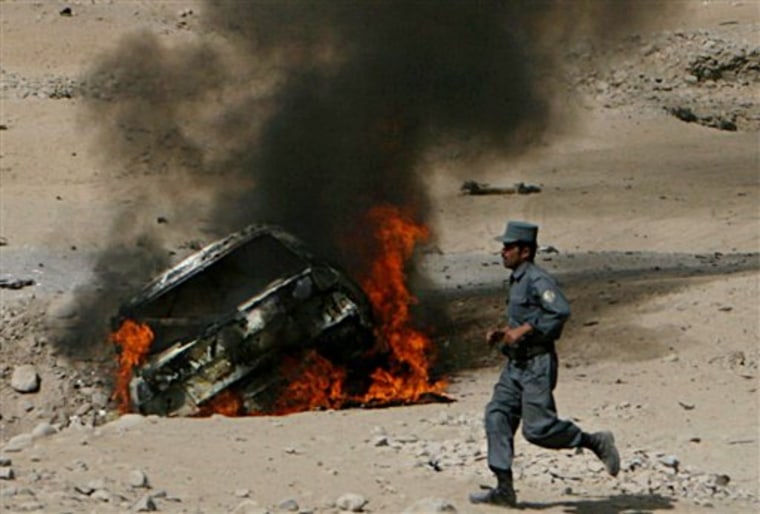A ruthless new generation of Afghan insurgents is casting aside Taliban doctrine that opposed killing large numbers of civilians, instead using more powerful explosives and packing bombs with ball-bearings to maximize deaths.
Just this week, some 140 people died in two bombings. Afghan security officials say the militants have started using C-4, a powerful explosive not seen before in Afghanistan
"It's not like Baghdad, but the terrorists are learning lessons from each other," said Abdul Manan Farahi, counterterrorism chief for the Interior Ministry.
The recent bombings are part of a bloody trend in the deepening Afghan conflict. Militants have stepped up attacks, and NATO has boosted its forces and taken the fight to the Taliban. Last year was the deadliest since the U.S. invasion of Afghanistan, with over 6,500 people killed in militant-related violence, mostly Taliban fighters.
Both sides have caused civilian deaths. According to an Associated Press count based on figures from Afghan and Western officials, militants killed 480 civilians in 2007, while U.S. or NATO action killed 360 civilians — many of them in airstrikes.
The United States and NATO have successfully worked to cut down on civilian deaths since a spate of casualties in June drew stern warnings from President Hamid Karzai and outraged the Afghan public.
At the same time, a surge in suicide attacks in the past two years is increasingly putting Afghan civilians at risk. There were only six suicide bombings in Afghanistan in all of 2003 and 2004. Militants ramped up such attacks in late 2005 and they've been rising steadily since, with more than 140 in 2007.
Sunday saw the deadliest insurgent bombing since the Taliban's 2001 ouster from power, when a suicide attacker killed more than 100 people at a dog fighting match near the southern city of Kandahar. The next day, 38 Afghan civilians were killed when a suicide car bomber attacked a Canadian military convoy, officials said.
A Taliban spokesman claimed responsibility for Monday's attack, claiming that only police and soldiers were killed. But the spokesman denied the militia was behind Sunday's killings.
More powerful bombs
The Afghan government has not formally accused the Taliban of Sunday's attack. However, Karzai's spokesman hinted the Taliban was to blame when he said the bombing had "all the hallmarks of previous attacks."
"Whether they claim responsibility or not, they are held responsible by the people of Afghanistan and the government of Afghanistan," Humayun Hamidzada said.
The Taliban insists that it is avoiding attacks that target civilians.
However, a militant spokesman said Taliban leaders have called on bomb-makers to raise the power of blasts against U.S. and NATO military forces, which could increase the possibility that civilians will also be killed.
"All these bombs that are stronger than before, this is because of the growing experience of our jihadi fighters," spokesman Qari Yousef Ahmadi said by telephone from an undisclosed location. "We will continue to make these kinds of bombs to attack our enemies."
A new insurgence emerges
Reclusive Taliban leader Mullah Omar has in the past called on his fighters not to carry out attacks around civilians, apparently believing that such killings hurt the militia's cause. But a new breed of ruthless militants has replaced dozens of insurgent leaders killed or captured by coalition and Afghan forces.
A recent analysis by NATO theorized that while the older Taliban leadership associated with Mullah Omar sought to avoid civilian casualties, "the new guys just don't care," said an official at NATO's headquarters in Kabul who asked not to be identified by name when revealing internal reports.
The influence of one such commander — Siraj Haqqani — is growing, the U.S. says. Haqqani, a Taliban-associated militant with close ties to al-Qaida, is accused of masterminding beheadings and suicide bombings reminiscent of the deadliest days of the Iraq war.
"We believe him to be much more brutal and much more interested in attacking and killing civilians. He has no regard for human life, even those of his Afghan compatriots," said Army Lt. Col. David Accetta, spokesman at the U.S. military's main base in Afghanistan, Bagram.
Accetta said the recent Kandahar bombings were "classic terrorist methodology — intimidate the population."
While it is difficult to identify specific links between militants fighting in Afghanistan and Iraq, military and counterterrorism officials have acknowledged there is a crossover between the Taliban and al-Qaida, and jihadists across the world share knowledge using the Internet and videos.
The U.S.-led coalition has said the tactics used by Haqqani are more closely aligned with "international jihadism" — a reference to al-Qaida — than tactics used by Mullah Omar or even longtime insurgent leader Jalaluddin Haqqani, a veteran of the war against the Soviet occupation and Siraj Haqqani's father.
The U.S. military has offered a $200,000 bounty for Siraj Haqqani, who the U.S. says is believed to oversee several madrassas in Pakistan that train insurgents. He has expanded his operations from eastern Afghanistan to include Ghazni and Wardak in central Afghanistan and into Helmand and Kandahar in the south.
Hamidzada, Karzai's spokesman, condemned the Taliban for attacking "soft targets" — a tactic already scaring war-hardened Afghans in Kandahar, former seat of the Islamist regime.
Ibrahim Khan, whose nephew was killed in Sunday's Kandahar bombing, said he told his relatives to stay away from crowds.
"I told my family especially not to go to cultural festivals or dog-fighting matches," Khan said. "These insurgents are carrying out attacks everywhere. There are no safe places. We are worried about our children. We are praying for God to bring peace to our country."
